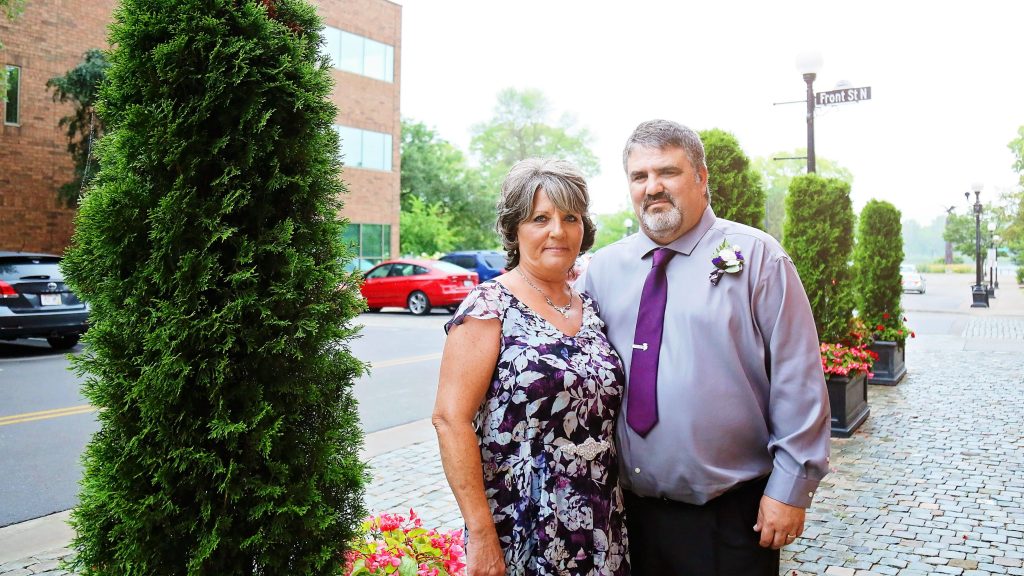
Carole Reisinger’s body was telling a story that nobody would ever want to hear.
"It started last February when I was diagnosed with kidney cancer. Thanks to the medical staff at Mayo Clinic in Rochester, five days later, I had a 9-by-5-centimeter tumor removed," says Carole Reisinger.
But it was during that surgery, the second story was about to be told.
"In the process of that surgery, the surgeons noticed my colon was inflamed and had a thickening of the wall. After speaking with the physicians a few days later, they proposed that I should get a colonoscopy done," the Warrens, Wisconsin, native adds.
After recovering, she took her physician's words to heart, and did the colonoscopy. It's something she says she should have done sooner.
"I had been having some signs of something wrong. My stomach had been crampy, and I did have blood in my stool at times," explains Reisinger.
In April, she was diagnosed with rectal cancer.

"Rectal cancer is a subset of colon cancer that is located at the final segment of your colon. Symptoms of bleeding and irregular bowel habits are common. Colon cancer begins when healthy cells develop changes (mutations) in their DNA. These changes unfortunately can also be hereditary," says Andrew Morris, M.D., colorectal and rectal surgeon, Mayo Clinic Health System in La Crosse. "Cancer inside the rectum (rectal cancer) and cancer inside the colon (colon cancer) are often referred to together as colorectal cancer."
According to the American Cancer Society, colorectal cancer is the third-leading cause of cancer-related deaths in men and the fourth-leading cause in women. The lifetime risk of developing colorectal cancer is about 1 in 23 for men and 1 in 25 for women.
The 64-year-old had to battle her second cancer in a matter of months. For the next six months, Reisinger would go through chemotherapy and then radiation treatments at Mayo Clinic Health System in La Crosse. In January of 2024, Dr. Morris and his surgical team removed the cancer, including most of the rectum.
"Advances in surgery have allowed colon and rectal cancers to be removed in a minimally invasive (small incision) fashion, often using the da Vinci robotic surgical system. Mrs. Reisinger was able to have the cancer completely removed, including the lymph nodes, and her colon reattached. Her recovery was generally quick due to the minimal pain related to the small incisions," Dr. Morris says.
Signs and symptoms of rectal cancer include:
- A change in bowel habits, such as diarrhea, constipation or more-frequent bowel movements.
- Dark maroon or bright red blood in stool.
- Narrow stool.
- A feeling that your bowel doesn't empty completely.
- Abdominal pain.
- Unexplained weight loss.
- Weakness or fatigue.
In some families, gene mutations are passed from parents to children increasing the risk of colorectal cancer. One in 3 people who develop colorectal cancer have other family members who have had it. Reisinger wasn't one of them.
"I know of no family history of colon cancer," she says. "After I was diagnosed, we did genetic testing, and that also came up with nothing. I guess I'm one of the lucky ones."
Besides family history, there are other factors that can lead to colon cancer:
- Older age. Colorectal cancer can be diagnosed at any age, but most people with this type of cancer are older than 50. The rates of colorectal cancer in people younger than 50 have been increasing, but doctors aren't sure why.
- African American descent. People of African ancestry born in the U.S. have a greater risk of colorectal cancer than do people of European ancestry.
- Inflammatory bowel disease. Chronic inflammatory diseases of the colon and rectum, such as ulcerative colitis and Crohn's disease, increase your risk of colorectal cancer.
- Eating a diet low in vegetables. Colorectal cancer may be associated with a diet low in vegetables and high in red meat, particularly when the meat is charred or well-done.
- Too little exercise. If you're inactive, you're more likely to develop colorectal cancer. Getting regular physical activity may reduce your risk of cancer.
- Diabetes. People with poorly controlled type 2 diabetes may have an increased risk of colorectal cancer.
- Obesity. Obese people have an increased risk of colorectal cancer when compared with people considered at a healthy weight.
- Smoking. People who smoke may have an increased risk of colorectal cancer.
- Drinking alcohol. Regularly drinking more than three alcoholic beverages a week may increase your risk of colorectal cancer.
Recent research shows the overall five-year relative survival rate for people diagnosed with rectal cancer is 68%. If the cancer is diagnosed at a localized stage, the survival rate is 90%. If the cancer has spread to surrounding tissues, organs and/or the regional lymph nodes, the five-year relative survival rate is 74%.
"The advances in chemotherapy, immunotherapy and surgical techniques are improving these survival rates in both rectal and colon cancer. Thankfully, the multiteam approach that is provided at Mayo with these cancers makes sure all treatment options and even study protocols are being used. Early detection is key though, as it gives the best chances for a cure," states Dr. Morris.
Reisinger's outlook is good. She can't thank the surgeons, physicians and medical staff at both Mayo Clinic in Rochester and Mayo Clinic Health System in La Crosse enough for helping her through both medical situations.
She does point out that all women (and men) should take responsibility and control of their own healthcare now and not wait until it's too late.
"My advice is to not put off a colonoscopy," says Reisinger. "Start at the age of 45 and begin paying attention to your body. Pay attention to your own bowel movements. They are a tattletale to your health."







